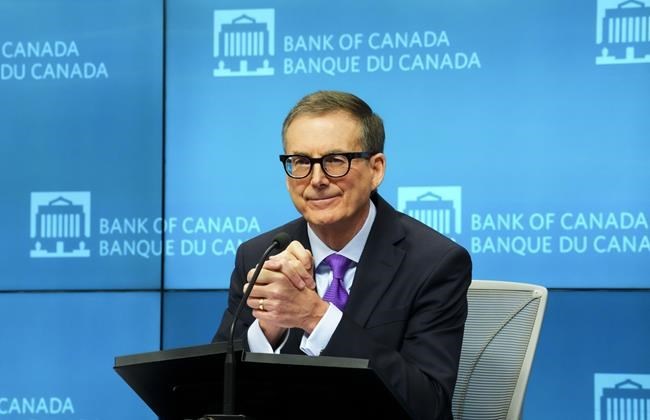OTTAWA — Bank of Canada governor Tiff Macklem says that although a slowing economy may not seem like a good thing, it is when the economy is overheated.
Speaking in Quebec City Tuesday, Macklem said that higher interest rates are working to cool the economy as elevated borrowing costs are constraining spending on big-ticket items such as vehicles, furniture and appliances.
As demand for goods and services falls, Macklem says the economy will continue to slow.
“That doesn’t sound like a good thing, but when the economy is overheated, it is,” he said.
In addition to global events, the overheated domestic economy pushed up prices rapidly, he said, with the inflation rate peaking at 8.1 per cent in June. To slow things down, the Bank of Canada embarked on one of the fastest monetary policy tightening cycles in its history. It has hiked its key interest rate eight consecutive times since March, bringing it from near-zero to 4.5 per cent.
The shock of higher rates has cooled things down: the inflation rate slowed to 6.3 per cent in December, the most recent month available, though it still sits far above the central bank's two-per-cent target.
Last month, the Bank of Canada said it would take a ‘conditional’ pause to assess the effects of higher interest rates on the economy.
“Typically, we don’t see the full effects of changes in our overnight rate for 18 to 24 months,” Macklem said Tuesday.
“In other words, we shouldn’t keep raising rates until inflation is back to two per cent.”
But the governor said the Bank of Canada will be ready to raise rates further if inflation proves to be more stubborn than expected.
As gas prices have fallen and supply chains have improved, inflation in Canada has slowed since peaking at 8.1 per cent in the summer. Macklem called this a “welcome development,” but stressed inflation is still too high.
For inflation to get back to two per cent, the governor said wage growth will have to slow, along with other prices.
Wages have been growing rapidly for months but continue to lag the rate of inflation. In December, wages were up 5.1 per cent.
The central bank says Canada's tight labour market is a sign of an overheated economy. In December, the unemployment rate was five per cent, just over the record-low of 4.9 per cent reached in the summer.
"If the labour market stays this tight, we're not going to get back to two per cent inflation," Macklem told reporters on Tuesday.
Though annual inflation is still at decades-high levels, economists have been encouraged by a more noticeable slowdown in price growth over recent months.
The Bank of Canada forecasts the annual inflation rate will fall to three per cent by mid-year and to two per cent in 2024.
With the Bank of Canada taking a pause from hiking rates and forecasts accounting for a significant slowdown in inflation this year, attention is shifting toward potential rate hikes down the line.
Markets are anticipating rate cuts as early as the end of 2023. However, when asked about potential rate cuts, Macklem said the central bank is still focused on whether interest rates are high enough to quash inflation.
"It's really far too early to be thinking about cutting rates," he said.
This report by The Canadian Press was first published Feb. 7, 2023.
Nojoud Al Mallees, The Canadian Press
